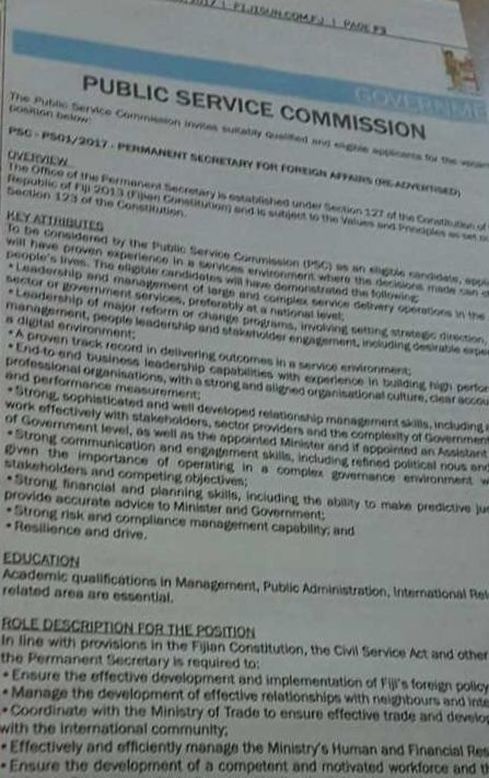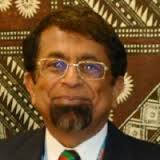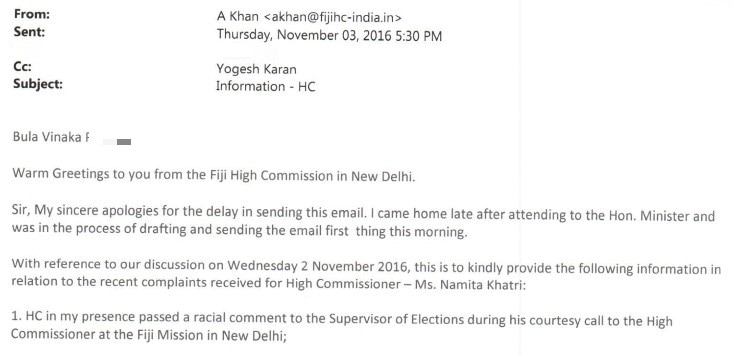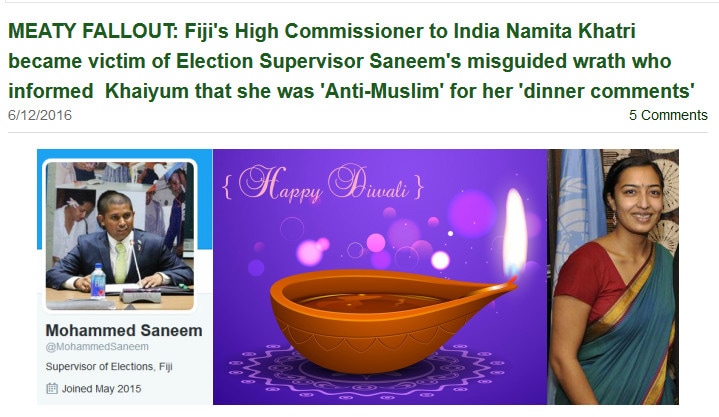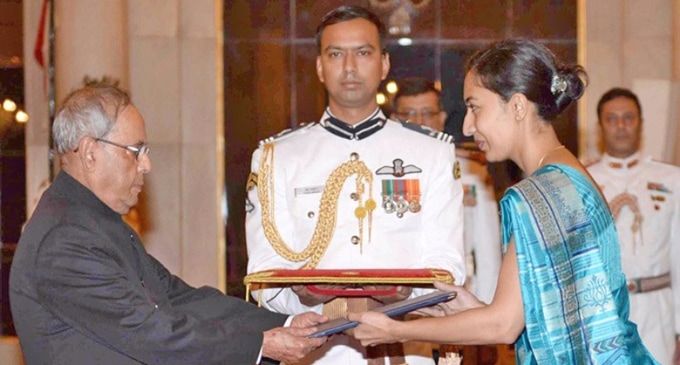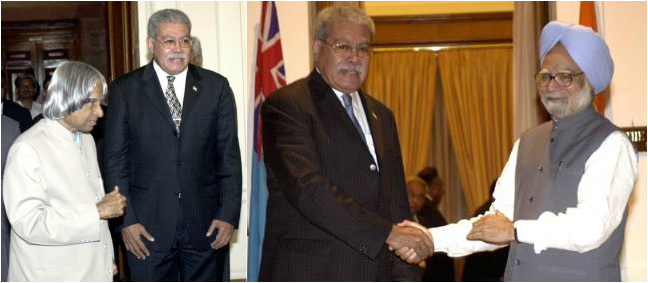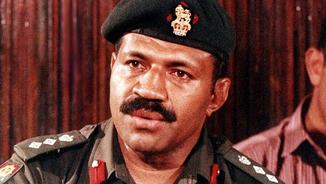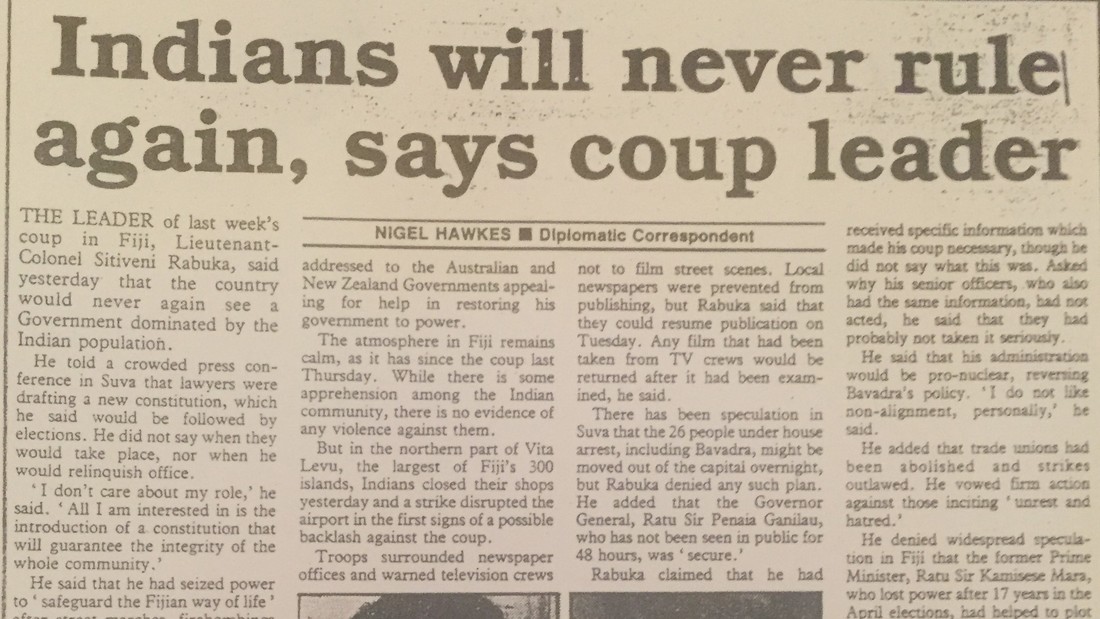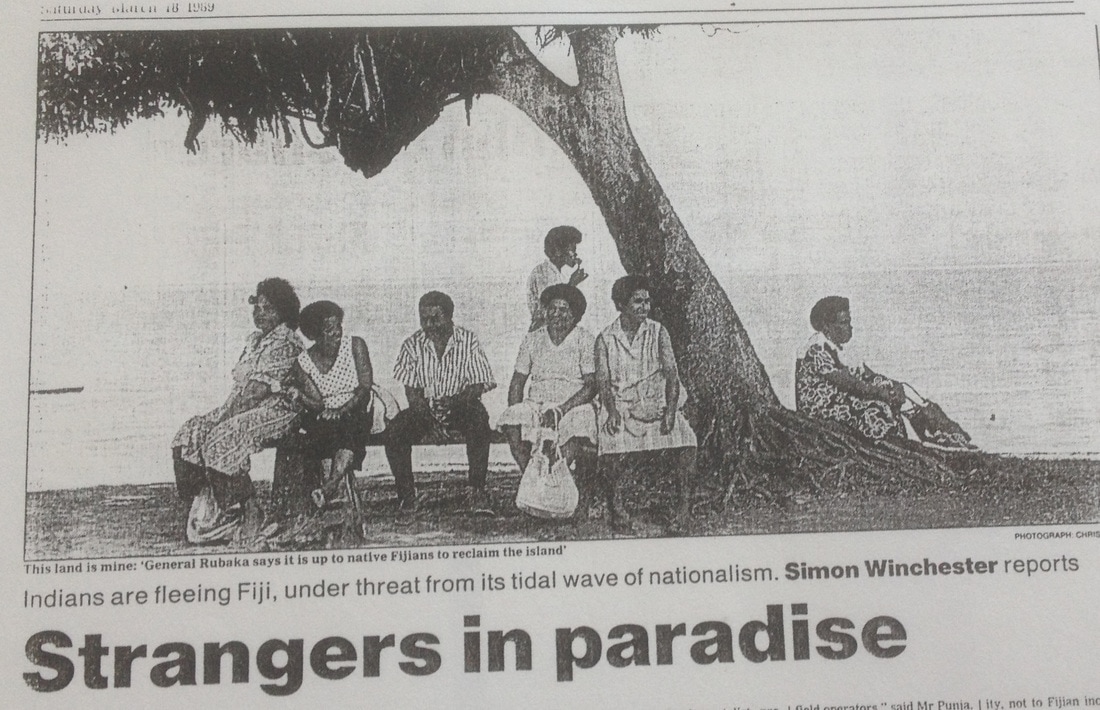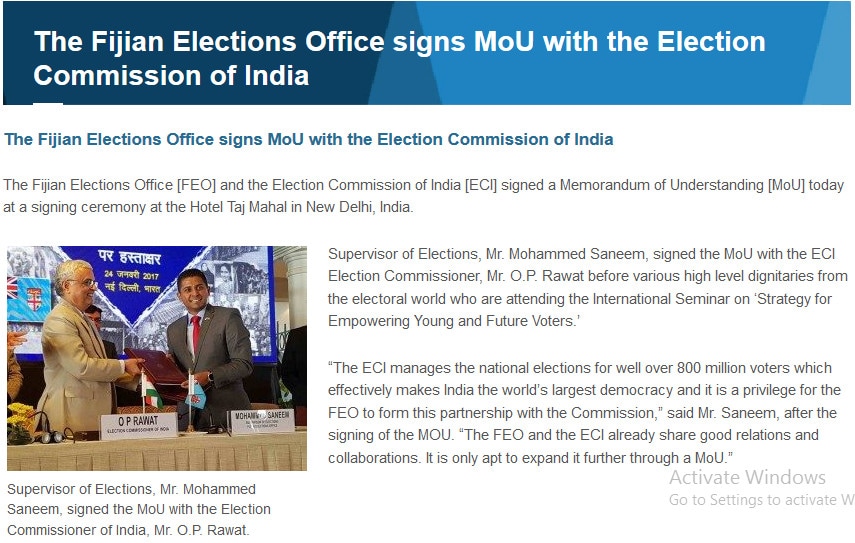http://www.fijileaks.com/home/robin-nairs-parting-requiem-to-his-foreign-ministry-staff-as-an-example-of-interference-in-the-work-of-the-ministry-i-attach-a-personal-email-to-me-as-an-example-of-manipulation-and-interference-in-my-work
COMING LATER: How Supervisor of Elections Mohammed Saneem exploited his connections with Minister for Elections Aiyaz Sayed Khaiyum, and got Fiji's High Commissioner to India, Namita Khatri, fired from her job, ending her stellar career in Fiji's Ministry of Foreign Affairs; all reminiscent of Sitiveni Rabuka's racist policies in the Foreign Ministry, and a reminder of the ugly "Dove" (Muslim) and "Flower" (Hindu) spat of the NFP in the second 1977 general election
From The Fiji Sun archive, October 2005:
Prime Minister Laisenia Qarase's visit to India with Love
By VICTOR LAL
"When Fiji set up its High Commission in Delhi, I expressed regret that an Indo-Fijian was not posted to represent us, and had suggested the name of the late Dr Ahmad Ali, as a suitable candidate. He would have been following in the footsteps of India ’s first High Commissioner to independent Fiji , Bhagwan Singh, the father of the current Indian High Commissioner. In November 1970, Mrs Gandhi appointed Bhagwan Singh to our islands after the Fijian delegation to India, comprising Ratu Mara and the late Opposition leader Siddiq Koya, cracked a pre-dinner joke with her that in case at any time the Indian Government found Bhagwan Singh missing from India , they could always trace him in Fiji where he really belonged. Both Singh’s father and grandfather had served as bonded labourers on the sugar plantations here. It was a dream come true, as Singh later narrated in his autobiography My Father’s Land – Fiji. His son Ajay Singh is today the new
Indian High Commissioner to Fiji."
In the book the Prime Minister will, no doubt, find many of the parallels and contradictions to his own problems in our country. In it, he will find that the Fijians are more akin to the Indians than the Indo-Fijians, whose old world, in many respects, vanished under the rigours of the indentured labour system.
India, as Varma reminds us, is the world’s largest democracy. It is a nuclear power. Soon it is bound to join the even more exclusive club of manned flights into space. By the year 2050 India will be the third largest economy in the world, after the US and China . And yet how, for example, does the appalling indifference of most middle-class Indians to the suffering of the poor square with their enthusiastic championing of parliamentary democracy? How, Varma asks, can a people who so wholeheartedly supported Mahatma Gandhi’s strategy of non-violence during the struggle for independence burn young brides for more dowries, and beat domestic servants to near-death?
Why do Indians have a reputation for being spiritual and ‘otherworldly’ when their philosophy and traditions exalt the pursuit of material well-being as a principal goal of life. They worship animal Gods, and yet the Indian dog is the worst treated animal in the country. Moreover, like the Prime Minister, the Indians thought of democracy as a British ‘foreign flower’ and yet hero-worship it.
Varma also points out how Indians take to factions as naturally as a fish to water, something that finds echo in the current Fijian political factions. It is a cliché that if there are two Indians there will be two parties, says Varma. Swami Vivekanada had once observed that ‘three Indians cannot act together for five minutes. Each one struggles for power and in the long run the whole organisation comes to grief. A strong centre of power can keep factions in abeyance’.
But why will India, despite all her above-mentioned negative traits, not fall apart, and why can its people expect to prosper in the years ahead? According to Varma, no one reason can answer these questions satisfactorily, but a combination of factors can. The unexpected survival of democracy, in a people not democratic by temperament or heritage, is one factor. Democracy has given Indians an institutional framework for the exercise of political choice and the freedom to express dissent. This has acted as an indispensable safety valve in an inequitable context with great discrepancies in the distribution of power and wealth. Although the more privileged citizens saw it primarily as a means for their own advancement, democracy has by the sheer miracle of its survival, given the weakest and the poorest a stake in the system.
In Fiji, the fundamentalist Christians want to declare the country a Christian state. And yet, why have so many faiths found a home in India (Christianity, Buddhism, Judaism, Islam etc etc). The first reason, according to Varma, is that Hindus (despite a militant few) are not and have never been, insecure about their religion. Historically, Hinduism has shown a supreme complacency towards any threat to its existence. Co-existence is an imperative, not an option, in India. Indians are pragmatic enough to understand this. The great majority of Hindus and Muslims feel that it is in their self-interest to swim away from the islands of religious exclusiveness inhabited by mullahs and mahants (Muslim and Hindu priests), towards the mainland of greater secular opportunities. In 1947, against the background of the massacres of partition, many learned observers felt that Hindus and Muslims could never live together.
The people of India have proved them wrong, and whatever the pessimists may say, Varma claims, the situation can only improve because of the emergence in the last decades of a sense of Pan-Indianness that refuses to be circumscribed by religion or region. If religious fundamentalism has not taken over the Muslims in India, one of the main reasons is democracy. A new India has emerged in the last fifty years. It does not deny the past, nor is it immune to its influence. But, it is more a product of the challenges of the present, and the opportunities of the future.
In politics, the idea of cohabitation has become inevitability. Caste and communal leaders have made it their virtue to share the spoils of power. Today, the Centre in Delhi is ruled by a coalition of over a dozen parties, and more than half of the states are governed by a coalition whose parties have hardly any common ideology. For too long, both the Indian and the foreigner, have been struck by the bewildering diversity of India, a nation of many languages and ethnicities, deeply divided by insular fealties. But today the great salad bowl of India is gradually emptying into a melting pot. In a pan-Indian context, most Indians are ‘minorities in India ’.
The first Prime Minister of independent India, Pandit Jawaharlal Nehru, whose ancestral original roots lie high in the valleys of Kashmir, spoke emotionally of Indians’ ‘majesty of soul’; he saw her as an anthropomorphic unity, Mother India, ‘a beautiful lady, very old but ever youthful’. He also spoke of Mother India’s ‘Overseas Children’. On the eve of India ’s independence Nehru raised the issue of citizenship, including that of Indo-Fijians, in the Lok Sabha on 8 March 1948: ‘Now these Indians abroad. Are they Indian citizens or not? If not, then our interest in them becomes cultural and humanitarian, not political. Take the Indians of Fiji and Mauritius : are they going to retain their nationality, or will they become Fiji nationals or Mauritians? The same question arises in regard to Burma and Ceylon . This House wants to treat them as Indians, and with the same breath it wants complete franchise for them in the countries where they are living. Of course, the two things do not go together. Either they get the franchise as nationals of the other country, or treat them as Indians minus the franchise and ask for them the most favourable treatment given to an alien.’
We are all too familiar with Nehru’s most memorable speech to the Constituent Assembly on the eve of India’s independence: ‘Long years ago we made a tryst with destiny. At the stroke of the midnight hour, when the world sleeps, India will awake to life and freedom.’ For us in Fiji, Nehru should be remembered for his famous speech much earlier, when he was fighting for the abolition of the Indian indentured system. On 29 December 1929, he told the Lahore Congress: ‘This is not from any want of fellow-being with our brethren in East Africa or South Africa or Fiji or elsewhere who are bravely struggling against great odds. But their fate will be decided in the plains of India and the struggle we are launching into is as much for them as for ourselves.’
And yet, when Indian independence came, he was far-sighted enough to urge Indo-Fijians to make Fiji their home, a point reinforced by her daughter, the late Indian Prime Minister Indira Gandhi when she visited Fiji in 1982: ‘India wants to see the Indians, wherever they have settled, adopt the country as their own and continue with their traditions, culture, and religion.’
The Indo-Fijians had already taken the advice to their heart, for 98 per cent of them opted to take out Fiji citizenship on independence in 1970. They could also take comfort and pride in the words of a former Indian High Commissioner to Fiji, Mrs Sonu Kochar, who reminded them, and inter-alia, the Fijian nationalists in 1982: ‘The Indian contribution to Fiji is no less a feat of pioneering endeavour than that of European settlers in Australia, New Zealand or USA, but with one notable difference. The Indians did not decimate the indigenous people. Instead, in many ways, they became shock absorbers in the harsh reality of a colonial era.’
She also reminded the Indo-Fijians of their rightful status in Fiji: ‘To those Indians who themselves want to migrate, to seek greener pastures, I have always said that they are chasing mirages. This is the piece of earth on which you were born, shaped, made aware; whose flowers you have learned to love and whose paths to roam. You belong here.’
It was not long after that statement that I found out what she had actually meant. In the late 1980s, I went to the Indian High Commission in London for a research visa to India. I thought of myself as a prodigal son returning ‘home’ for the first time since our arrival in Fiji in 1879. It was a shock to my system when I was told to pay for the visa. I jokingly put to the Indian High Commissioner, whom I had met when he had accompanied Mrs Gandhi to Fiji as her Private Secretary, that it is India that has to pay for ‘selling’ our forefathers as coolies to work on the sugar plantations. In reply, and in zest, he gave me a simple test to fulfil – the three Rs. I failed the test miserably. I was a non-Returnable Indian (India was not my home), a non-Recognisable Indian (no caste or regional language), and a non-Rupee Indian (didn’t send remittances to India ).
I was, however, a truly Recognisable and proud Indo-Fijian. As a matter of fact, the majority of the descendants of Indo-Fijian labourers had lost contact with ‘Mother India’ long ago, except some like the Chaudhry family whose relatives live in Haryana. The following declaration of an ex-indentured woman labourer Rangamma, in 1979, who arrived in Fiji with her parents in 1899, still applies to the majority of Indo-Fijians today: ‘Fiji is my place. There is nobody in India for me.’
And it is this truly unique identity of ours in Fiji that the Indo-Fijian leaders must nurture and cultivate if we also want to turn the country into a truly melting pot. I always find it obnoxious and insulting to our history and heritage in Fiji when Indo-Fijian leaders talk down to us during radio interviews, at election rallies, funerals, and on other religious occasions, in pukka Hindi, which a vast majority of us fail to understand or absorb, instead of the colloquial Fiji-Hindi, which even our Fijian brothers understand and speak in many parts of the country. It is time we cultivated our Indo-Fijian heritage and history and not merely Indian history. It would be the first step towards reconciliation of the two major races.
The PM and Indigenous Rights Test
Finally, why do I support Prime Minister Qarase’s trip to India. I have already outlined some of the lessons he will be able to bring back with him in nation-building, hopefully. I would go further, and urge him to take Mahendra Chaudhry, as Leader of the Opposition, with him for the opening of the Fiji High Commission in New Delhi .
When Fiji set up its High Commission in Delhi, I expressed regret that an Indo-Fijian was not posted to represent us, and had suggested the name of the late Dr Ahmad Ali, as a suitable candidate. He would have been following in the footsteps of India ’s first High Commissioner to independent Fiji , Bhagwan Singh, the father of the current Indian High Commissioner. In November 1970, Mrs Gandhi appointed Bhagwan Singh to our islands after the Fijian delegation to India , comprising Ratu Mara and the late Opposition leader Siddiq Koya, cracked a pre-dinner joke with her that in case at any time the Indian Government found Bhagwan Singh missing from India , they could always trace him in Fiji where he really belonged. Both Singh’s father and grandfather had served as bonded labourers on the sugar plantations here. It was a dream come true, as Singh later narrated in his autobiography My Father’s Land – Fiji. His son Ajay Singh is today the new Indian High Commissioner to Fiji .
But the ball is in Chaudhry’s court, if Qarase makes an offer to him to accompany the official delegation to India . If Chaudhry rejects the offer, India must neither encourage nor condone if, by some quirk of events, the FLP sends him separately to Delhi, to coincide with the Prime Minister’s visit. The FLP has a remarkable history of sending its people to right places at the right time. To remind India, the Prime Minister Qarase is booked to be their honoured guest from 8-10 October 2005.
Significantly, the trip is important in another very important respect, which may be even beneficial to Chaudhry if he decides to once again gun for the Prime Minister’s job: should a minority leader rule over an indigenous majority? The Prime Minister’s visit might take the indigenous/immigrant rights debate over leadership out of the debate in the 2006 election.
For today THE KHANS-Shah Rukh Khan, Aamir Khan and Salman Khan, all Muslims whose ancestors came with their culture and religion from Arabia, rule the box-office destiny of Bollywood and feel no need to appear to be anything but themselves. A.P.J.Abdul Kalam, the President of India, is a Muslim and the Oxford-educated Dr Manmohan Singh, the Prime Minister of India, is a Sikh, whose 3,000 co-religionists were only two decades ago murdered during the anti-Sikh riots following the assassination of Prime Minister Mrs Indira Gandhi by two Sikh bodyguards.
In an overwhelming indigenous Hindu India, no one has objected to a Muslim President and a Sikh Prime Minister. In Mrs Sonia Gandhi’s case, despite being married to the Gandhi family, she had still clung on to her Italian citizenship. Of course, it should not have been held against her. After all, a vast majority of Indians had voted for her and her Congress Party.
In conclusion, India is the only country on the planet where no Fijian Prime Minister will be able to sell the ‘Indigenous Race Card’ to justify Fijian nationalism, racism, and exclusive political control of the country.
For the Indians will be able to shoot it down by reminding the Prime Minister of his hosts – a Sikh and a Muslim- who are ruling a billion indigenous Hindus.
We hope that the Prime Minister will, on the other hand, immensely benefit from the India trip, a country that has skilfully straddled the modern, medieval and the ancient at the same time. As India Today magazine noted in August 2005:
‘The world today is a different place and so is India. India may be an old country but we are a young nation with 70 per cent of our citizens under 35 years. With all its traditions and heritage, India is now a forward-looking nation. It is almost as if we have been freed again from the shackles of our past.’
We hope that the people of Fiji will also benefit from the Indian state visit.
It is high time the Indo-Fijians should say with Mark Anthony in Julius Caesar, ‘I love Caesar but I love Rome more’- ‘We love India but we love Fiji more.’
It is equally time we formed a GOPIFO (Global Origin of People of Indo-Fijian Origin) to help Fiji survive in the 21st Century.
For their part, the Fijians must also play a constructive role, and extend their hand of togetherness, for it will take both hands to wash away the ugly stains from the 1987 and 2000 coups.
Unfortunately, a glaring omission from the Delhi celebrations in October will be the voice of Indo-Fijians through our national anthem. For one reason or another, while the national anthem ‘Blessing grant oh God of Nations’ has been translated into Fijian, ‘Meda Dau Doka’, it has NEVER been translated into Fiji Hindi or Indian Hindi, for that matter.
Surprisingly, no Indo-Fijian leader of repute has called for a translation of the national anthem.
It is no doubt, therefore, that many Indo-Fijians have grown up singing Sa reh jahan se aacha, Hindustan hamara, hamara (Of all the lands, India is the best land).
Its time the Fiji Government’s actions spoke louder than words.
Bon Voyage. To India With Love! Jai Hind.
Fiji mata ki jai ho! Isa Lei, Fiji.
The views expressed are those of VICTOR LAL and not that of the Fiji Sun.
